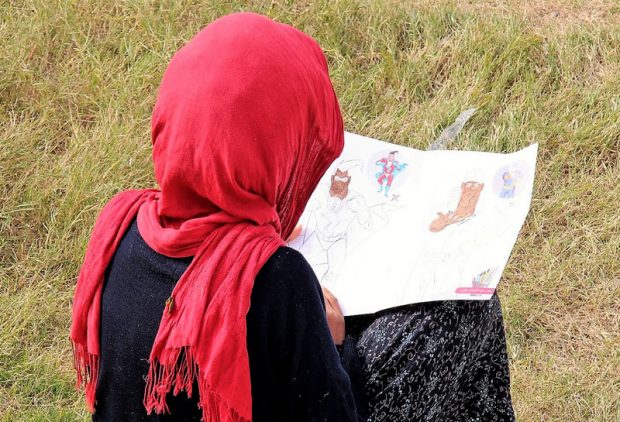IOM launches psychosocial support programme at Libyan migrants detention centres

IOM has begun to roll out a psychosocial support programme for migrants at Libyan detention centres with the launch of a one-day recreational event at Tripoli’s Abu Salim centre.
“We do nothing but eat, drink and sleep, the only entertainment we have is talking to each other and that is very annoying. Sometimes I wish I could die. But today I feel alive again,” said Esse (not her real name), who is at the Abu Salim centre with her two children aged three and one.
The one-day event kick-started a wider IOM strategy, developed in coordination with an NGO, Psychosocial Support Team (PSS), to provide support to women and children, who are particularly vulnerable.
The support will be introduced at a number of detention centres, starting in the capital, Tripoli. There are an estimated 3,000 to 6,000 migrants at detention centres in Libya who are all considered vulnerable.
IOM Libya Protection Officer Karolina Edsbacker explained: “These activities not only offer the migrants a break from the misery they face inside the detention centres, but they also serve as a measure to build trust between the PSS team and the children in particular.”
“Providing psychosocial support for migrants inside detention centres is a pioneer project that has never been tried in Libya before,” said PSS Executive Manager Khaled Hamidi.
Forty-one women and 19 children participated in the full day of activities in Abu Salim, which included dancing and singing, sports, games and drawing. The participants also received clothes and Sahleb (a traditional Libyan drink).
“The visit of the PSS team was successful from all points of view and their visit contributed to improving the mood of the detained women and their children, who are very vulnerable. We would like these visits to be planned on a monthly basis in all detention centres and we want IOM to continue to organize such events and provide assistance,” said Deputy Manager of the Abu Salim centre Faraj Abuejila.
“After some time inside detention centres, the migrants feel as if there is no hope. Through these activities, we want to give back some hope, our aim is that they will see some light in all the darkness,” said Hamidi, who visits the detention centres on a regular basis on behalf of IOM.
At the same time, IOM, together with UN and other agencies, is also looking into alternatives to detention, particularly for women and children, in order to better ensure the human rights and protection of migrants in Libya.
IOM’s psychosocial support is funded by the US State Department’s Bureau of Population, Refugees and Migration (PRM) as part of a project: Addressing Irregular Migration Flows and Upholding Human Rights of Migrants along the Eastern African Migration Route and North Africa (Noah phase VI).
How to submit an Op-Ed: Libyan Express accepts opinion articles on a wide range of topics. Submissions may be sent to oped@libyanexpress.com. Please include ‘Op-Ed’ in the subject line.
- China’s reported Libya dealings raise regional power questions - January 02, 2025
- Disease control center confirms no human rabies cases in Libya - January 02, 2025
- Russian gas through Ukraine halts - January 02, 2025


